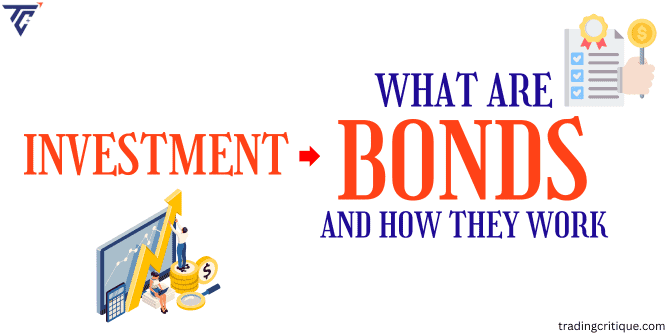Bonds: What it is, Types of Bonds & How they Work
Are you seeking for safe investment with predictable returns? Our 2024 guide unlocks the world of bond investment, helping you navigate this secure investment option. Learn what bonds are, explore different types, and discover how they work to generate predictable income.

Quick Insights
A bond is like a loan you make to a company or government. You buy the bond, essentially giving the company or government a loan.
Understanding terminologies is crucial before investing in bonds. They help you evaluate the risk and potential return of a bond.
Explore the different types of bonds such as corporate, municipal, and government offer unique benefits and risks. Consider your risk tolerance and income goals to choose the right fit for your portfolio.
What is a bond and how does it work?
A Bond is a financial instrument that functions like a loan, but instead of providing a loan directly, you earn interest by buying a bond.
How do bonds work?
What are bonds?
- Bonds are issued by companies or governments. Governments and companies need money to finance projects and operations. They can raise this capital by issuing bonds.
- Bonds come with a specific face value, which is the amount of money you get back when the bond matures.
- They also have an interest rate, also known as the coupon rate. This is the percentage of the face value that the issuer pays you periodically. It is usually every six months or annually until the bond matures.
Buying bonds and selling bonds
- Investors buy bonds on the primary market when they are first issued by the government or corporation.
- You can also buy and sell existing bonds on the secondary market, where bonds are traded between investors.
- Bonds can also be traded on the secondary market, where prices can fluctuate based on bond market interest rates and the creditworthiness of the issuer.
In exchange for lending your money, the borrower promises to pay you back the original amount you loaned (principal) with interest over a set period (maturity). You receive the interest payments periodically and get your principal back at maturity.
Terminologies to be known before investing in bond
The basic terminologies to be known before investing in bonds are given in the following.
Bond issuer
The entity borrowing money, such as a government or corporation, that issues the bond.
Face value
The initial principal amount of the bond that the issuer promises to repay at maturity.
Coupon rate
The interest rate offered by the bond typically is expressed as a percentage of the face value. This interest is usually paid periodically (semi-annually or annually).
Maturity date
The specific date on which the issuer must repay the face value of the bond to the investor. This date refers to the length of time you hold the bond until you receive your principal back in full. Bonds can have varying maturities, ranging from a few years to decades.
Coupon payments
The periodic interest payment that the issuer makes to the bondholder.
Yield to Maturity (YTM)
The total returns an investor expects to receive if they hold the bond until maturity and all interest payments are made as expected. It considers both the coupon rate and the price at which the bond is purchased.
This is the estimated total return you expect to receive if you hold the bond until maturity and all interest payments are made on time.
Credit rating
An assessment of the issuer’s creditworthiness and ability to repay the debt. Lower-rated bonds typically offer higher coupon rates.
Bond rating
Bond ratings are a crucial factor to consider when investing in bonds. These ratings are assigned by independent rating agencies like Moody’s, S&P Global Ratings, and Fitch Ratings. It can assess the creditworthiness of the issuer and their ability to repay the borrowed money with interest.
What are the different types of bonds?
What are the types of bonds? There are different types of bonds available for investment. Some of the common types of bonds are given below.
- Corporate bonds
- Municipal bonds
- Government agency bonds
- Treasury US government bonds
Corporate bonds
This bond is issued by the companies to raise money for various purposes such as funding expansion projects, mergers and acquisitions, and simply covering operational costs. Unlike government bonds, corporate bonds carry varying degrees of credit risk. These bonds risk late or missed interest payments.
The credit risk associated with a corporate bond is reflected in the interest rate. Generally, bonds issued by companies with a higher credit rating offer lower interest rates. Bonds from companies with a lower credit rating (high yield or non-investment grade) offer higher interest rates to compensate investors for the increased risk of default.
Corporate bonds offer investors the potential for higher returns compared to government bonds, but they also come with varying degrees of credit risk. Investors need to carefully consider the financial health of the issuing company before investing in corporate bonds.
Municipal bonds
Municipal bonds are a type of debt security issued by state and local governments within a country. These bonds are used to finance a variety of public projects.
- Building schools and hospitals
- Funding environmental projects
- Upgrading roads and bridges
- Constructing public transportation systems
Benefits
- Depending on your location and the specific bond, the interest earned on municipal bonds may be exempt from state and local taxes as well. This tax exemption can significantly increase your overall return on investment.
- Municipal bonds are generally considered to be less risky than corporate bonds because they are issued by the governments. However, there is still some risk of default, especially for bonds issued by smaller or less financially stable municipalities.
Overall, municipal bonds can be a good investment option for those seeking a steady stream of tax-exempt income and are willing to accept a lower level of risk compared to corporate bonds.
Government agency bonds
Government agency bonds are a type of debt security issued by the federal government or government-sponsored enterprises (GSEs) in the United States. These agencies play a crucial role in various sectors of the economy, and the bonds they issue help finance their operations and programs.
Benefits
- Government agency bonds frequently offer higher interest rates than treasury bonds issued by the U.S. government. This makes them an attractive option for investors seeking a balance between risk and return.
- Government agency bonds are less risky compared to corporate bonds. Because they have explicit or implicit back from the U.S. government. If the agency has financial issues, the government provides support to the agency.
- The interest earned on some government agency bonds may be exempt from state and local taxes, although not typically federal income tax. It is important to check the specific tax status of each bond before investing.
Overall, government agency bonds can be a good option for investors seeking a balance between low risk and higher potential returns than treasuries.
Treasury US government bonds
Treasury bonds are also known as T-bonds. It is a debt security issued by the U.S. government. They are considered one of the safest investments available because the U.S. government is obligated to repay the borrowed money with interest to the bondholders.
Benefits
- Due to the government backing, treasury bonds are considered one of the safest fixed-income investments.
- Treasury bonds provide regular interest payments (coupons) throughout the life of the bond, offering a predictable source of income for investors.
- Treasury bonds are high liquidity, meaning they can be easily bought and sold on the secondary market. This provides flexibility for investors who may need to access their money before the maturity date.
Treasury bonds are a great option for investors seeking a safe and reliable source of income with low risk. They are particularly suitable for risk-averse investors or those nearing retirement who prioritize capital preservation.
To understand these types of bonds, it is important to carefully consider your individual investment goals and risk tolerance before investing in any type of bond.
Explore different bond options
The additional bonds to consider are as follows.
- High yield bonds
- Zero coupon bonds
- convertible bonds
- Saving bonds
High yield bonds
It is also called junk bonds. These bonds are issued by companies with a higher risk of default (not paying back their debt). Because of this risk, they offer significantly higher interest rates compared to investment-grade bonds. It is suitable for investors comfortable with higher risk for potentially higher returns.
Zero coupon bonds
Unlike typical bonds that pay periodic interest, zero-coupon bonds are sold at a discount to their face value. Your return is the difference between the discounted purchase price and the face value you receive at maturity.
Convertible bonds
These bonds function like regular bonds, paying interest periodically. However, they come with the unique feature of being convertible into a predetermined number of shares of the issuing company’s common stock at the investor’s discretion.
Saving bonds
Savings bonds are issued by the U.S. government, they offer a guaranteed return with minimal risk. They are designed to be a safe and steady investment for individuals, especially those saving for long-term goals.
Conclusion
Investing in Bonds offer a valuable way to generate a steady stream of income. They can be a good fit for investors seeking capital preservation, diversification, or predictable returns.
By understanding the different types of bonds such as corporate and government bonds, and their associated risks, you can make informed decisions to incorporate bonds into your investment portfolio. Do your research and consider consulting with a professional financial advisor to create a diversified investment portfolio that aligns with your goals.
Pro Tip
Ready to explore the world of bonds and start earning a steady income? Learn more and explore bond options with our trusted forex brokers today! You will get clear information on Stocks, Bonds, Forex, and Cryptocurrency, through our website.
FAQs - Frequently Asked Questions
1. How do investors make money on bonds?
Investors can make money on bonds in two ways. They are interest payments and capital gains.
2. How do you buy and sell bonds?
There are two main ways to buy and sell bonds.
Primary market: When a company or government first issues a bond, it is done through the primary market. You can usually invest through a brokerage firm or bank.
Secondary market: Most bond trading happens on the secondary market, where investors buy and sell bonds from each other. This provides liquidity, allowing you to sell your bond before maturity if needed.
3. What are the disadvantages of investing in bonds?
The main disadvantages of investing in bonds are given below.
- Interest rate risk
- Lower potential return
4. Are high yield bonds a good investment?
High-yield bonds are also known as junk bonds. It offers the potential for higher returns, but they also carry higher risk, price volatility, and less liquidity. These bonds might be suitable for investors with a longer time horizon and a higher risk tolerance.
5. What is a stock bond?
Stock
- When you buy a stock, you become a shareholder in the company.
- Return comes from capital appreciation and dividends.
Bond
- When you buy a bond, you are essentially loaning money to a company or government.
- Return comes from fixed interest payments paid periodically until the bond matures.

Subscribe to
Our Newsletter
Latest Posts
How to Trade Forex | Learn 6 Strategies and Tips
Discover the world of forex trading with our comprehensive guide. Learn essential...
Read MoreFP Markets Review 2024: Everything You Need To Know
Founded in 2005, FP Markets is a leading online broker renowned for...
Read MoreHow to Invest in Ethereum in 2024 – Simple Guide for Beginners
Ethereum is a decentralized blockchain platform that enables smart contracts, enabling secure,...
Read MoreIs Cryptocurrency a Safe Investment? What You Need To Know
Investing in cryptocurrency involves selecting the right cryptocurrency and securely storing your...
Read MoreHow to Read Forex Charts for Beginners • Simple Methods
Traders look for the currency pair price movements, their patterns, and their...
Read MoreBonds: What it is, Types of Bonds & How they Work (2024 guide)
Are you seeking for safe investment with predictable returns? Our 2024 guide...
Read MoreWhat are The Best Crypto Trading Strategies for Beginners in 2024?
Unsure about choosing the best trading strategies for beginners in 2024? This...
Read MoreForex Pairs: How They Work, How To Read, Examples
Forex pairs are combinations of two different currencies that are traded in...
Read MoreBest Ways to Avoid Losses in Forex Trading
Foreign Exchange – Forex market is the world’s largest financial market in...
Read More








